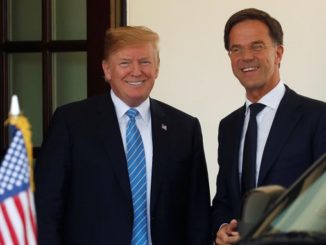
Liberal activists who hounded the GOP throughout its failed ObamaCare repeal bid are gearing up to hit any Democrat who strays from the fold on tax cuts for the wealthy, including some of the party’s most politically vulnerable incumbents, Politico reports.
Democrats were spared the sight of their progressive base battling centrists on ObamaCare, which proved a uniquely unifying issue for both wings of the party. But there’s no guarantee that taxes will be another kumbaya moment for Democratic leaders, who have long struggled to contain tensions between red-state lawmakers facing tough reelections and a grass roots emboldened by resistance to President Donald Trump’s agenda.
Whether Democrats can stay united will help determine the fate of Trump’s tax push, a legislative priority that’s become all the more important to Republicans after the demise of his health care bill.
And Democratic harmony is already somewhat at risk. The White House is reaching out to centrist House Democrats, and three moderate Senate Democrats declined to sign onto a recent letter outlining their caucus’ consensus position on taxes. Winning any bipartisan support would make rewriting the tax code far easier for Trump and Republican leaders.
Liberal groups are vowing to fight the GOP tax bill as hard as they battled ObamaCare repeal. They’re expecting Democrats to stand together against any legislation that cuts taxes for the rich, even if it also trims tax bills for others. And they’re prepared to unleash their energized grass roots on any lawmaker who doesn’t get on board.
“The goal is to defeat any attempt to cut taxes for the wealthy. That means any Democrat or Republican who signs on for such a proposal should expect to incur the wrath of a public that thinks the economy is already rigged in favor of the rich and shouldn’t get any worse.” MoveOn.org Washington director Ben Wikler said in an interview.
MoveOn and more than two dozen other liberal groups have launched a campaign dubbed Not One Penny that’s designed to marshal opposition to any tax legislation that lowers the tax bills of wealthy individuals and corporations.
Liberals hope their focus on grass-roots organizing will overcome a push by conservative groups like the Koch-backed Freedom Partners Chamber of Commerce and Americans for Prosperity, which are spending millions of dollars aimed partly at pressuring Senate Democrats from Trump states to back a new tax bill.
Still, outside-the-Beltway-style civil disobedience proved effective at mobilizing public opposition to Republicans’ ObamaCare repeal plan. Liberal activists are betting that red-state Senate Democrats like Joe Manchin of West Virginia, Heidi Heitkamp of North Dakota and Joe Donnelly of Indiana — the trio that did not endorse their caucus’ principles of no tax cuts for the wealthy, no increase in the deficit and no use of procedures to avoid the filibuster — won’t want to attract the glare of their spotlight.
“We’re not really worried about the Democratic ranks right now, because we’re in a political situation where we have [Senate Majority Leader] Mitch McConnell and the White House punching themselves out,” said CREDO Action political director Murshed Zaheed, whose group launched a pro-Obamacare billboard campaign in June targeting Manchin, Heitkamp and Donnelly.
“Of course, if we see any movement, any tangible report that Senate Democrats are having trouble holding the line on the tax reform fight, then we will engage,” Zaheed added.
Indivisible, the anti-Trump group that rocketed to prominence this year by flooding town hall meetings with frustrated constituents, is routing tax reform information to its members even though significant votes may not happen until next year. Policy manager Chad Bolt vowed the group would work just as hard to keep Democrats aligned on taxes as it did on healthcare.
“We really wanted Democrats to stand strong and draw attention to the healthcare bill moving through the Senate, and they did. So we intend to hold Democrats accountable just as strongly on the tax fight as we did on healthcare.” Bolt said in an interview.
McConnell already has announced plans to shield any tax bill from a filibuster using budget reconciliation, a procedure that allows him to pass legislation with as few as 50 votes from his party alone. It’s the same tactic he tried and failed to use to repeal ObamaCare.
Republicans point out that reconciliation doesn’t preclude minority-party votes for a tax package, and note that bipartisan tax cuts passed in similar fashion in 2001 and 2003. But the parties are far more polarized in the Trump era, and using the filibuster-proof maneuver so soon after the healthcare battle risks poisoning the well with many Democrats.
“There’s actually an argument that it’s easier to get to 60 than it is to get to 51, because when you operate from the premise that you’re going to do a partisan proposal, you end up with odious policies,” Senator Brian Schatz said in a recent interview. Republicans would surely beg to differ, but McConnell was ultimately unable to find the votes for a healthcare bill that could satisfy all his party’s factions.
Conservative groups counter that red-state Democrats have an opportunity to help shape the tax bill by buying into the process early.
“Democrats and Republicans have been saying the same thing for years about problems with the tax code — the difference is that now we have the opportunity to fix it. We’re hopeful that people like Joe Manchin, Claire McCaskill, Joe Donnelly and others will put politics and partisanship aside and work together to help deliver a simple, fairer and flatter tax code that will lead to more jobs, higher wages and greater financial security.” Freedom Partners spokesman Michael Bars said.
Although the tax fight is in its earliest stages, progressives don’t believe they need to spend big money or threaten to support primary challengers to Democrats who back a GOP-written tax bill. Liberals say momentum is on their side thanks to an activist base that was further galvanized by the failure of ObamaCare repeal.
“Without question, it plays to the advantage of holding Democrats together” on taxes, Center for American Progress Action Fund campaign director Emily Tisch Sussman said in an interview.
“For Democrats holding a hard line against Republicans and against Trump, they’re in very high favorability with their base and independents right now,” Tisch Sussman added. Red-state Democrats “want to find an issue to moderate on, but cutting taxes for the wealthy and corporations is unpopular.”
In a memo written last week with top Democratic pollsters at Hart Research and the Mellman Group, the Not One Penny campaign sought to stiffen Democratic spines by citing widespread public opposition to further tax breaks for the wealthy and corporations. “Progressives can win this tax debate,” declares the memo, a copy of which was shared with Politico.
But the memo also cites polling in which a majority of respondents supported tax cuts for the wealthy as part of a broader proposal that also slashes taxes for “people like me” – unless activists emphasize the comparably larger size of the breaks that higher-income taxpayers would get.
“It is critical for progressives to contextualize the disproportionate benefit that the wealthy and corporations will receive from this tax plan,” the memo states.




Be the first to comment